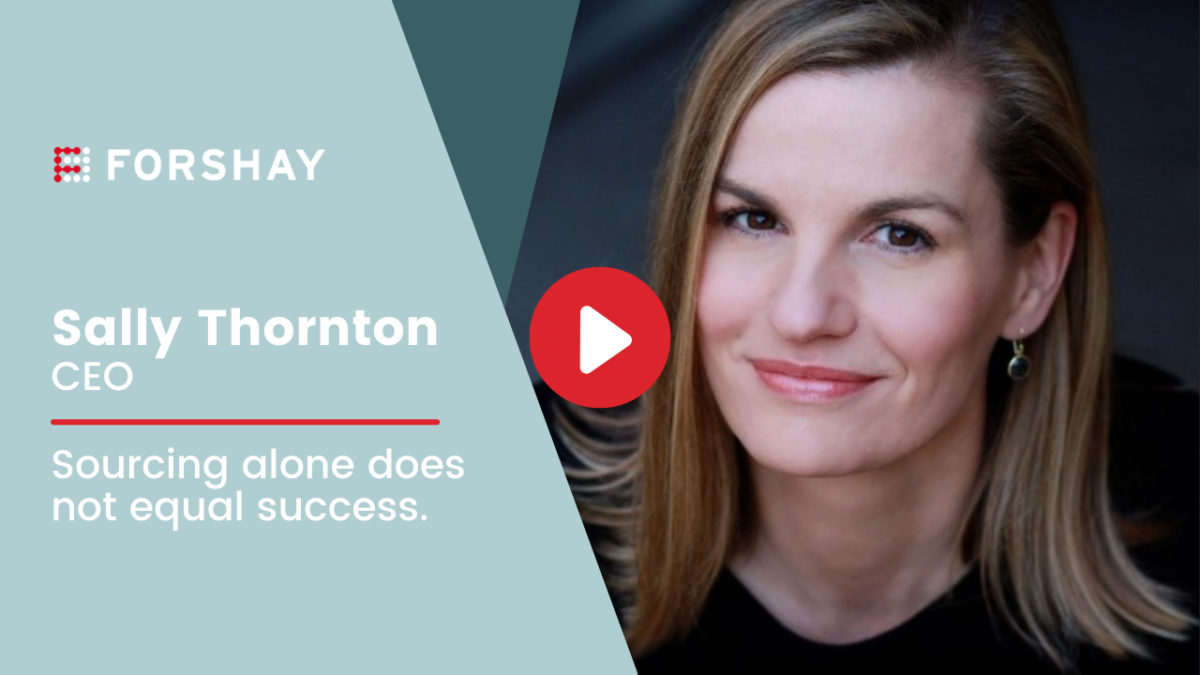Sourcing is important. So is sourcing “through the yes.” How do you build long-term relationships to ensure that both the company and the candidate are happy not just now, but years from now? Hear Sally Thornton’s answer in this short video.


Sourcing is important. So is sourcing “through the yes.” How do you build long-term relationships to ensure that both the company and the candidate are happy not just now, but years from now? Hear Sally Thornton’s answer in this short video.

It’s not easy, and also, it’s not that hard.
What it is: putting someone (or a small team depending on your company size) focused on addressing burnout systemically because it’s not each individual’s problem to figure out. When to do it? Right. Now. Own your power, whatever amount it is, and wield it for good.
The simple solution of hiring more people to help out employees working too many hours might feel easy as long as you have budget, however, the job market is painfully competitive right now, and (you don’t have to say this part out loud to your executive) it may not be necessary to hire new people if you’re not in hockey stick growth.
Instead, think through what the interim role would be for the next 3-6 months to cover those extra hours of work that your team is shouldering. What could an interim person do part-time or full-time to take some tasks off your team’s plate? What will help reduce the absurd amount of pressure? After you sort that out, it’s our job to find that person and get them into your organization ASAP to be an extra set of capable hands to get you through. Or leverage some of your alums from your company who know your culture, and could jump back in. Do you feel yourself already relaxing?
This tongue twister is focused squarely on any manager who, like a star athlete, needs to keep building that muscle of people leadership skills. We all make the mistake of (occasionally?) thinking that our team can just figure it out. We’ve hired smart, talented people, and they can just get in there, roll up their sleeves and solve problems left and right. But what we see happen is that if high-performers don’t have clarity around their goals or regular conversations around priorities, they’ll burn the late night oil, and then burnout. Unfortunately, what can happen is people who historically perform highly will feel frustrated, exhausted and ineffective in this “great reassessment”. Those feelings can lead to poor performance which leads to dissatisfaction with the job. It’s a lose/lose situation.
Add to this, Gallup who articulated the current matrix madness well in, “Too Many Teams, Too Many Bosses: Overcoming Matrix Madness”. You’ve heard us talk about collaborative overload, but in a pandemic it’s reached new highs (or lows). Certain people in highly matrixed teams bear the brunt of being “pasted to every email and meeting invite.” Not only does that leave people physically exhausted, emotionally burned out and prone to quitting, it leaves them precious little time to do their own, actual work. We all know who those employees are (maybe you?). They are lucky to have a break between meetings or lunch away from their keyboards. Forget having time to think strategically, plan ahead or even properly manage and support their teams.
Fortunately, we have some experience helping with this very problem. For high performers and people leaders who thrive in building their leadership muscle, we built a simple (meaning clear) workshop where the interplay of boundaries, priorities, focus, and well being are woven together in actionable language and frameworks that work. It can be helpful to delineate the difference between “being nice” and creating a sense of well-being in the workplace. Why is this difficult? Because we often think that taking care of ourselves, setting boundaries and communicating should be natural and intuitive. But (of course) it’s just a muscle that (like other muscles) needs oxygen and new exercises to perform well.
And the results speak for themselves. Sonos leaders shared:
“This is by far the best workshop I’ve been lucky to attend.”
“Let’s get it out to our managers!”
“More of these – VERY PRACTICAL and immediately impactful, targeted topic.”
“Lots of exercises and reflections! I wondered if a two hour workshop would seem long, but this one didn’t because it was so liberally sprinkled with exercises.”
“Productive ideas and solutions for how to strengthen a team’s ability to prioritize, focus, and set boundaries.”
Well-being at work. Support team holistically.
If you feel valued at work, have boundaries, clear priorities, and ability to perform highly you are far less likely to “reassess” or resign. You’ll feel energized, challenged and… well, it’s a word that is sort of overused but we’re going to drop it anyway: fulfilled. When you enable yourself and your team to have well-being, everyone does better work. And when they do better work, they feel good. It’s a virtuous cycle.
Thankfully for you, there’s no need to summon up an innovation guru to help. Let us do the heavy lifting for you (it’s what we built this org to deliver). Hit us up for a chat, take a slow box breath (just like the Navy Seals do), and let’s move these ideas into action. We’re in this together.
